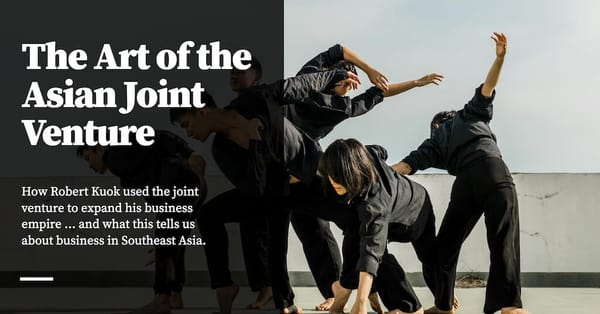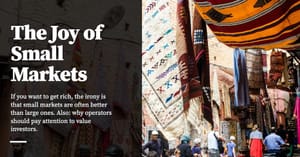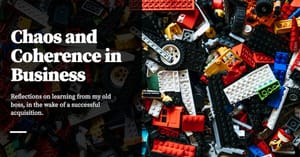Note: This is Part 11 in a series of articles and cases on Asian Conglomerates. Read Part 10 here. You may read more about the Asian Conglomerate Series here, or view all the published cases here.
At this point in the Asian Conglomerate Series you should know what tycoon skill looks like. Briefly, because the majority of Asian tycoons prosper as a result of political capture:
- You may evaluate tycoon skill by how well they do when the capital cycle turns.
- You may evaluate them based on how well they hold on to the political favour they have (this is over the course of decades — which makes this partially a succession issue; partially an issue of skill in cultivating power).
- And, finally, you may evaluate them by how well they expand into polities and geographies where they have little-to-no political influence.
It is my assertion that Robert Kuok, the ‘Sugar King of the East’, is skilful because he is very good at that third thing.
Most Asian tycoons are not able to expand into other countries. Not many can deal with straight-on competition, and not many can prosper when they lack the political protection so necessary to their success. Some attempt to put up joint ventures (JVs) with other tycoons, but most arrangements don’t do as well — for obvious inter-personal reasons. Robert Kuok is one of the rare exceptions to this pattern: over the course of his multi-decade career, he has successfully expanded his business interests out from Malaysia, to Singapore, to Indonesia, and then to Hong Kong and China and on and on. Today, his business interests span multiple industries across six continents — something few Asians tycoons can boast.
This instalment serves to show how he does what he does. The primary case, Robert Kuok: The Art of the Joint Venture, is members-only. I recommend that you read that case in parallel to this piece, if you have access. But excerpts from that case will be embedded throughout this essay; there are some interesting things that Kuok does that I want to draw your attention to.
Shallow Waters
Earlier in this series I wrote that it’s not clear why tycoons in Asia expand indiscriminately into so many other businesses and so many industries. I speculated:
Why do these tycoons expand outwards? Academics will say things like “the cost of capital is lower in a conglomerate structure”. This is almost certainly the wrong way to look at this. The reasons are more prosaic and we may guess at them: partially tycoons expand for security, because diversification is wise and many of these tycoons grew up under the uncertain conditions of war. Some would say that it is due to greed — the types of businesspeople who seek out lucrative and defensible markets are by nature greedy opportunists. A third reason is that they are given opportunities to expand due to their closeness with political power, and the risks for expansion are low given the certainty of their core cash cow. (In the case of South Korea, it is sometimes the case that they are ordered to grow, because economic development was directed by dictators until 1997). But I will propose a fourth reason, which emerges from our discussion of power: power is controlling something people want. To simplify crudely, politicians want money; tycoons want protection from competitive arbitrage. In a complex, decentralised government, there will always be more stakeholders to appease than resources available from growth, unless you are in an extremely lucrative business. Expansion becomes necessary to ensure you always control something that politicians want.
With Robert Kuok we actually know why.
After Kuok's breakthrough profits on the international sugar trading scene in the early 1960s, he dabbled in new markets like flour milling, shipping, aviation, and steel. However, he felt limited by the size of Malaysia’s (and Singapore’s) domestic markets. Every industry that he expanded into felt too small, like clothes he continuously outgrew. In Kuok's own words:
In Malaysia, I always felt like a little fish swimming in shallow waters. As soon as I tried to dive, I would hit the concrete bottom of this man-made pond. So you need to swim laterally all the time. You couldn't go down deep. In the fishing world, the best fish are those that can dive deep, like the tuna. If I could only dive deep — and that could easily take up 20 years of my life — I might not even have the energy to go sideways. But in Malaysia, the only choice open to me was to expand sideways, so I swam as fast as I could.
If I had been fortunate enough to be born in Indonesia, I would probably have taken a different course. There, the waters are deep; the fish are plentiful. Whatever industry I would enter in Indonesia, which has a huge population and landmass, would last my family three generations. So I envied what the businessmen of populous Indonesia were able to do.
Unsurprisingly, Kuok turned early towards the archipelagic nation.
This is the problem when you are born in South East Asia. Every market around you is small, and if you want to build an empire you must expand horizontally into many different industries. In a podcast interview a few weeks ago, Singaporean business academic and writer Vaughn Tan pointed out the exact same thing, but in a modern context:
The function that [Singapore’s Economic Development Board] EDB has is to go out and find potentially good companies to locate a head office for Asia in Singapore or to locate R&D facilities or something in Singapore. I think our strategy for economic development has also been very subtly but very profoundly affected by this idea that we need to go big and we need to go with successful business models [that target large markets]. I think this doesn’t actually work for the Southeast Asian context. I'll say why.
A lot of the kinds of companies that we look at as being successful tend to come from countries where it’s possible to have a total addressable market that’s very big. The US is one market where you know you’ve got like ... I don’t know, 280 million people or something. You can build a very big company that reaches massive scale inside just the US alone. Same with China. To some extent — not the same — but similarly, in India.
If you look at Southeast Asia we look as if we’ve got countries that are very big like Indonesia. But if you look at Indonesia, Indonesia is not one single country. It’s got ... I don’t know how many languages. It's extremely geographically spread out. Southeast Asia is actually a region of very very small — relatively speaking — markets. In the Southeast Asian context trying to build companies from Singapore like tech companies [of the US or China] or any other kind of company that has some massive TAM I think is a dream. It’s a dream that will never become a reality because the market does not exist like that. Instead what Singapore should be doing is something that East Asia has been doing for a long time. We build conglomerates that are composed of companies that are individually actually quite large ... but they never have the kind of total addressable market that we are aiming for. But [each business] is big enough to deal with the size of the markets that they deal with.
This was what I meant when I wrote “studying the large business in your neighbourhood is perhaps just as — if not more — revealing; local conglomerates, like the study of local trees, can tell you much about the soil around you.”
An Understanding of Relationships ... and Power
Kuok cut deals with many, many tycoons in his time. If you look at his JVs, the bulk of them happened because he had something that the other partner needed at the beginning.
And the vast majority of those deals were done with these other businessmen dictating the terms of the deal.
At the start of Kuok’s Bogasari deal, for instance:
But that initial excitement wore off when the two companies sat down for discussions. This is what Liem Oen Kian, Liem Sioe Liong’s longtime partner and co-founder of Waringin, told Kuok:
“Let's do it this way. Our new company will need US$5 million in paid-up capital. We'll try to raise the rest by loans, since we have got such a tremendous monopoly business. Now, Waringin doesn't have much cash. So, for every dollar of equity in this joint venture, you must put up 75 cents and the Waringin side will put up 25 cents. But since the flourmill is in our country, the shareholding shall be reversed: We will own 75 percent; you will hold 25 percent.” Oen Kian also said that Kuok Brothers must provide all of the bank guarantees to import plants and machinery, since their side lacked credit standing with the banks at that point.
On hearing their terms, Hock Toh [a director of Kuok Brothers and Kuok's thirteenth cousin] became irate. I saw from his body language, his expression, and particularly his eyes, that he was about to burst out. I signalled him with my eyes to say, "Shut up. Shut up." In other words, it's not your turn to speak. I quickly spoke up before he could start any nonsense, and said, "Sioe Liong, Oen Kian, I understand the situation and I accept. And I will furnish the banker's guarantees for the first flourmills."
Then Liem Oen Kian said, "The President has decided to issue a ruling to restrict the project to Indonesian nationals only. Therefore, you cannot surface. Your 25 percent has to be held by us for you." And so, for 20 or more years from the early 1970s, we owned 25 percent of Bogasari without a scrap of paper to prove it.
As a result, Kuok's name was never listed as a shareholder. This arrangement was far from fair, but the Kuok Brothers were determined to see it through.
And the deal with Yani Haryanto and Bulog (the Indonesian state commodities agency that managed the price and distribution of basic staples):
Yani had an important role — he was entrusted by Suharto to buy all the foreign imports of rice and sugar needed for the country. While the task technically belonged to Bulog, under the command of General Arifin, Yani came in as an unofficial and unlicensed intermediary, likely due to his Dutch education and ability to speak English. As he wasn’t a commodities trader, he requested Kuok to offer him rice and sugar at competitive world prices, which often meant discounts. From the offered prices, Yani would check on the world price, then come back and either accept or bargain. In his memoirs, Kuok described the complicated arrangement in this way:
Yani would require the first sugar delivery to be made three months from the date of signing, followed by additional deliveries at four months, five months, and six months. He would study the market and say: “Well, the world futures quotations are this, but I want a $5, $10 discount to that.” I had to judge the market and close the contract. I usually covered a portion first and carried the risk for the rest. If the market fell and showed me a better margin of profit because I had already closed my selling price to him, then I would buy in some more futures.
Let’s say, theoretically, I made a sale of 100,000 tons. I would quickly cover 20,000-30,000 tons and probably make $3 a ton. Then, say, the market dropped by $8 after 4-6 weeks. I would cover another 25,000-30,000 tons and I would probably make about $8-$10 a ton. Since I now had some paper profit under my belt, I could take a bit more risk. Of course, if world sugar prices shot up, we honoured everything and took a hit.
I could see that Yani was adding on huge margins. He was very shrewd. He said, “You and I do a deal first. We sign. But the official contract will be between you and Bulog.”
I said, “But how am I to safely operate between doing the deal with you and my contract with Bulog with commodity prices fluctuating so rapidly?”
He answered, “You have my word, because behind me is the President. Arifin will always honour it.” And that remained true up to the very end. Whatever I did with Yani was honoured by Arifin.
And finally, when Kuok was brought into the partnership that would kick off the Shangri-La chain of hotels:
Ang Toon Chew, whom Kuok had met in Bangkok’s rice trade in the early 1950s, was approached by a land broker in Singapore to purchase land on Orange Grove Road. He haggled for the price and bought it for S$5 a square foot in 1967.
This site was purchased through Petaling Garden, a Malaysian real estate company of which Ang was founder, chairman and largest shareholder. Kuok's old commodity-trading friends, Ho Yeow Koon and Tan Kim Yeow, were also large partners in this firm. The trio initially planned to build terrace houses, but was stopped when they brought on more staff onto the project: a Cambridge-trained architect named Heah Hock Heng and a leading stockbroker in Singapore named Jacob Ballas. Both Heah and Ballas, seeing the land virtually in the middle of the city, urged them to build a hotel instead, and suggested Kuok as a potential partner. They argued that Kuok “got along well with senior Singapore Government officials” so he could help in applying for conversion of the land from residential to commercial use. This was true; Kuok had attended the same school that many of the then-ministers in the Singaporean and Malaysian cabinets had.
Other tycoons were just as capable of starting new JVs with businesspeople in other countries. What differentiated Kuok was the shrewdness and — counterintuitively — the conduct he brought into each deal.
The shrewdness bit is easy to understand: in these deals — and in fact, in the vast, vast majority of the deals covered in his memoirs — Kuok was needed nearly as much as he needed the other party in the JV.
But the conduct piece is interesting to study.
Each of these JVs were lucrative for Kuok’s business. And in each of them he put in the work, with nearly no legal protection, with the hopes that he would be treated fairly. The enticement was simply that there would be future business that could be done together; assuming that Kuok Brothers weren’t shafted in the back.
Kuok was not above taking a beating, or getting the short end of the stick, so long as it was a net profitable arrangement for his business interests.
At multiple points in the case you see him falling back on ‘fair play’. This is, if you think about it, odd. When Anthoni Salim wanted to inject Bogasari into Indocement, Kuok remonstrated, but then walked away.
In the end, Kuok Brothers' feelings of unfairness and undercompensation came to a head. When Anthoni Salim took over in 1992 and wanted to inject Bogasari into Indocement, converting their shares to cement shares, Kuok was dumbfounded.
I remonstrated with Yao. I said, "Why should a cement company want to gobble up a wheat-flour factory? One is in building construction; the other is in food." I really had Hobson's choice: I had no proof that I was even a partner! By hinting at morality, I tried to massage them towards my way of thinking and drop the idea of combining Indocement and Bogasari.
Kuok ultimately failed to sway Anthoni Salim. The Kuok Brothers finally had enough. They left that very year.
Notice how he did not duke it out in the courts.
Notice, also, that the Bogasari deal was lopsided: the Salims needed his expertise in the beginning, but then had little ongoing need for him as time passed and the plant printed money.
Compare this with the dynamic when Kuok dealt with Yani Haryanto. Notice, also, how he handled the falling out with Yani, especially when compared to a British corporation:
Even so, Yani was slowly but surely adding on huge markups. While he began by asking for relatively modest discounts of US$10-15 a ton, by the early 1980s, he was asking for a US$120 mark-up, at the expense of Kuok’s own trading margins. Kuok didn't complain. He simply put up with it for as long as the arrangement was profitable, until 1980, when Yani insisted that Kuok take a loss on a large trade in order to keep higher profits for himself. At this point, Kuok put his foot down, and Yani broke away to go with ED&F Man, a competitor.
In his memoirs, Kuok gives his side of the story, in a way that is revealing of the complex relationships between all the players. Because Kuok ate the loss whenever commodity prices went against him, Bulog’s General Arifin appreciated Kuok Brothers as a counterparty.
In about 1980, before Yani broke with me, he came to me and said, “The contract we signed last month: I want you to cut it by $15 a ton.”
I said, “Yani, I am making well under $10. How do you expect me to cut by $15?” Yani had already worked on my sugar trader, James Lim, first. James pleaded with me to cut or at least to give in to part of the request. I said no, and James kept warning me there’s danger from Yani.
I remember explaining to Arifin, “Yani signed the contract with me, then he wanted a reduction. I have to stand firm. James Lim wants me to give way, but I know that, with Yani, if I give way once I no longer have a real contract with the man, forever. Today, he says cut $15. In future, he’ll ask me to cut God knows how much. It’s the principle.” I could see that the relationship was coming to an end.
When I went to see Yani shortly afterwards, he warned me: “If you don’t cut, you won’t get the next business.” Sure enough, he soon went over to Man.
At Bulog he said, “Arifin, I want this contract to be between you and Man.”
Arifin asked, “What about Robert Kuok?”
Yani replied, “No, nothing for him.”
Then Arifin called me and said, “I’ve got Pak Yani in front of me, and he is telling me to cancel the contract. What have you to say?”
I replied, “I don’t know. It’s up to Yani, isn’t it?”
Then apparently he turned around to Yani and said, “I can’t allow this. The most I can allow is for you to give half to Man. You must give the other half to Kuoks. They have served us well. How can you behave like this to them?”
And then came the deal that caused the men the most trouble:
A few months later, I had another phone call from General Arifin. He said, “Yani is trying to get a huge deal, 1,200,000 tons, and he wants to give it all to Man. I am putting my foot down, because we at Bulog are grateful to you for all the years that you have done business with us. You have honoured every contract. You have even helped us to plan our requirements.”
He protested to Yani and told him the business must be shared between Man and Kuoks. Yani said, well, in that case I want to give Man more because I don’t want to deal with Kuoks any more.
I think Yani signed a contract with Man for 700,00 tons and with Kuoks for 500,000 tons, delivery commencing about eight months forward. This was 1983, I think. Five or six months later, he still couldn’t open the letters of credit. Without comparing notes, Man and we both chased him for the letters of credit, without which you dare not ship the sugar. Then we heard unsettling sounds from Yani’s camp, implying that President Suharto had decided not to approve the deal, a ploy that Indonesia had never used before. The sugar market was falling, so it was financially unfavourable for them to honour the contract. Until then, for five or six years, Yani had been giving those same instructions and honouring every contract.
ED&F Man took Yani to arbitration in London, while we stayed our hand. Our finance and trading boys worked out the total amount of our active claim with him. It came to US$105 million, compared to Man’s US$160 million claim. Man took Yani to court in England and won; Yani appealed and lost on the appeal.
In this weakened position, Yani came to see me in Singapore. We sat in the lobby lounge of Shangri-La Singapore and came to an agreement. He asked what minimum settlement I would claim from him. I said, “If you pay me US$35 million, I’ll forgive the rest. In the past I have made profit from you.” I think we settled for about US$33 million and he actually paid us that amount.
After Yani settled with me, he received advice from a lawyer that he could counter-sue ED&F Man in Indonesian courts. So he counter-sued Man, and to make it look real, he counter-sued me.
Round after round, the Indonesian judges decided in favour of Yani against Man. We were summoned, so I went storming down to Yani’s house in Jakarta and said, “What’s all this about? You asked to settle with me, and we settled in the lobby of the Singapore Shangri-La Hotel. You said that’s all you were willing to pay me, and I accepted everything. There are legal papers to prove all this. You may have the judges on your side, but why are you doing this? Ever since you came to Hong Kong to ask me to help you buy sugar and rice on the world markets for you, I have served you properly and correctly. What have I done wrong?”
He muttered, “Never mind, never mind, I’ll deal with it,” or something like that.
And the matter died a natural death.
The Shangri-La Deal
There are two things I want to call out in the Shangri-La deal. The first is this: isn’t it interesting that Kuok didn’t let his sense of fairness get in the way of making money?
My indirect talks with the Petaling partners [through Heah and Ballas] went on for weeks before they officially approached me and asked if I would join them. They needed my help to get the site approved for hotel development. I replied, "Okay, but I am an outsider today. What do you want me to do?"
They said they would cut me in for ten percent, prorated according to their shareholding in Petaling Garden. But, they quickly added, "We've been sitting on the land for a year, so you have to compensate us for it as well as the appreciation in land value."
I thought to myself, "When I invited Ang Toon Chew and Tan Kim Yeow to be my sugar-refinery partners in Prai in 1959, I brought them in on the ground floor. The refinery was already a roaring success in 1966, making them pots of money. I also offered them ground-level entry into my flour-milling business. But now they offer me this piece of land, and it's not at their cost-price. They want paper profits on appreciation of the land. They are bringing me in on the third floor."
The irony was, though I owned only ten percent, it was my personal effort that made the whole project hum.
As part of Kuok's stint in international sugar trade, he had stayed in some of the finest hotels in Europe and America in the 1950s and 1960s. Out of all of them, he ostensibly had the most ‘experience’. During board meetings, he took the chair without formal appointment, resolving a number of administrative issues right off the bat. For starters, Kuok pointed out that his partners had not even incorporated the hotel company properly. He found a shell company that was insolvent but not bankrupt, and owned by ten firms. Because the firm wasn’t bankrupt, it had a tax credit. Kuok proposed that they buy the shell from the partners, inject the Shangri-La land into it, recapitalise it, and then change the name. Kuok’s partners agreed, and they did as he proposed.
And, second, isn’t it interesting that Kuok partnered with Western, learnt the ropes of the business, and then replaced them as management company across their properties over the course of years?
In truth, Kuok knew what he wanted in a hotel but was street smart enough to know he didn’t know what it took to run a hotel business. In his memoirs he reflects: “I took to commodities trading like a young duckling takes to water. But hotels — I didn’t have a clue! I didn’t understand good hotel architecture, interior design, management or even room size. What I did know from my experience in the business world was that if you meet with the wrong types and you’re led up the garden path, you could lose years of time and end up with lawsuits on your hands. Then you would be tied up in knots.”
Due to Heah's inexperience in hotel design, they brought on Yozo Shibata, a Japanese hotel architect, to the project. When Shibata met with Kuok and some of his colleagues in Tokyo in 1968 to discuss plans, he realised that they were totally lost. He advised them to give up managing the hotel themselves, and instead hire a hotel management group. He recommended Western International Hotels of Seattle.
With Western heading the management, Shangri-La officially opened in 1971.
From the Kerry Holdings website.
In the next several years, Kuok learnt the ins and outs of the trade from Western. There was very little magic in running it, he realised — it was simply a matter of providing good service.
I never studied management, but whatever I learned at home and in school taught me that everything in life is very simple. So why complicate matters? Weary travellers need to sleep on a comfortable bed; they need to have a good bath; if they're too tired to walk 100 metres to a restaurant, you should provide some good food and beverage outlets for them. Everything else is a gimmick.
(...) I came up with a saying that I constantly repeated at the early board meetings of Shangri-La Singapore. I said, “We must set out to do three things, in this order: To look after our hotel staff; to look after our guests; to look after our shareholders.”
This was a pattern that Kuok would repeat with many other businesses over the years.
Wrapping Up
So what can we learn from all of this?
I won’t insult your intelligence and tell you that Robert Kuok was a honourable man who is admired across the region because of his staunch business principles. The man is 100 years old this year; certainly, this seems to be the consensus, and certainly that is what many, many individuals I’ve talked to believe.
But the case above is constructed primarily from Kuok’s memoirs, and public perception may be forged if you have enough money applied for long enough in the right way. You should be suspicious, and you should discount what I — and many others — think of the man.
No, I think I shall leave you with two thoughts, both of them quite conservative.
The first is an observation that you can verify for yourself: it is true that Kuok has had remarkable success operating in polities outside his home country. The same cannot be said for many of the other tycoons you might chance on in the region.
The second is a trite conclusion that I think is useful to mull on:
When there’s no rule of law, it is useful to:
- Act honourably,
- Maintain relationships for the sake of commerce — which, plainly: means eating one’s own sense of fairness and ego when there’s a lot of money to be made.
- Do deals where it is possible to be ‘long term greedy’ with your counter-party ... over the course of many years and many transactions.
- Rely on man’s sense of fair play when things go south.
- But never cut a deal where you’re not needed as much as you need the other party.
- Never cut a deal where you can’t walk away.
- And never cut a deal you can’t take a loss on when you do.
I do not believe this is 100% true, but I suspect that it was mostly true for Kuok, for the times he lived in.
How universally true these conclusions are is left as an exercise for the alert reader.
This is Part 11 of The Asian Conglomerate Series. You may read Part 12 here: Tycoon Succession.
Originally published , last updated .
This article is part of the Operations topic cluster, which belongs to the Business Expertise Triad. Read more from this topic here→
This article is part of the Market topic cluster, which belongs to the Business Expertise Triad. Read more from this topic here→
This article is part of the Capital topic cluster, which belongs to the Business Expertise Triad. Read more from this topic here→






